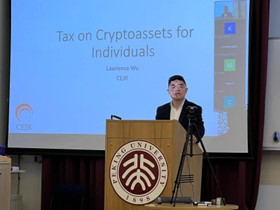Today, on a rainy spring of 25th May, we have the pleasure of having Dr Lawrence Wu with us to talk about if virtual assets will be taxed in the UK. Dr Wu is a senior tax accountant, providing many businesses and corporations with tax consultation, and also lecturing taxation and other accountant courses for Brunel University. He has also been holding visiting positions at a number of schools across world – Aston University in Birmingham UK, Grenoble School of Management in France, University of St James in Spain, as well as Renming University and University of Jiangxi for Finance and Economics in China, just to name a few. Dr Wu is also a fellow member of AIA and possesses vast practical experience in mergers and acquisitions, accounting, taxation, and business accounting.

Thus, it is our honour to have Dr Wu here today to talk about the hot topic of cryptoassets and the word that strikes dread into everyone – taxation. As more and more people are investing in the crypto market and as individuals increasingly earn income on their cryptoassets, that income may be considered, at least in the UK, an income source and thus taxable on an arising basis. Further, with the volatility in the crypto market, how does one conduct the valuation of cryptoassets? Is it a capital gains tax? If so, how does one calculate those gains? What about those cryptoassest that are traded on exchanges that do not use the pound sterling? In this seminar, Dr Wu aims to address these issues surrounding the taxation on cryptoassets and the implication for investors.

Dr Wu started off the seminar by explaining how HM Revenue & Customs (HMRC) views investing in cryptoassets. He pointed out according to the HMRC cryptoassets manual, individuals generally will be treated as holding “cryptoassets” as a personal investment and will be subject to capital gains tax on disposal. To exemplify his point Dr Wu explained that the HMRC views different types of cryptoassets as separate assets for capital gains purposes. For example, if one exchanges Bitcoin for Ethereum, it would trigger a disposal for capital gains tax purposes even if no actual currency has been received. Dr Wu stressed that the key word in this instance is “disposal” and individual investors, in order to meet their tax obligations, be it gain or loss, may be required to make more disposals of cryptoassets into actual currency.
Dr Wu also highlighted the instance in which some individuals may be paid in cryptoassets, such as those who are involved in the mining of cryptoassets and those in the tech industry. If individuals are paid in cryptoassets, HMRC would treat this as income and would be subject that to income tax. However, Dr Wu did point out that whether that amount is treated as trading income is dependent on several factors such as the application of specific case law principles of trading versus investment.

As we all are familiar with the decentralised and digital nature of cryptoassets, i.e., they cannot be pinpointed to a physical location nor do they exist anywhere, therein lies a complication - the location or “situs” of these cryptoassets. We all know that for tax purposes, location is vital for tax purposes - particularly for UK resident or non-UK domiciles – as it affects one’s tax implication dramatically.
To answer this complication in location, Dr Wu pointed out that the HMRC’s view on the situs of exchange tokens, including the likes of bitcoin. HMRC’s view is that an exchange token is located wherever the beneficial owner is a resident. Therefore, if the cryptoasset owner is a tax resident in the UK, the cryptoasset is deemed to be located in the UK, and thus subject to UK tax.
As Benjamin Franklin once said, “in this world, nothing is certain except death and taxes”. The question of tax is very complicated and intriguing and everyone wants to know how much they are liable when they invest. Naturally, after the seminar, there are numerous questions about the UK taxation rules. We thank Dr Wu for sharing his knowledge and expertise with us. We definitely learned a lot on the taxation rules surrounding cryptoassests!





